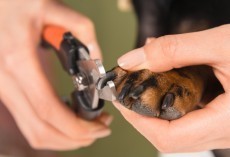Incurable diseases, whether they affect a human or animal are painful to go through. It's also hard to see a loved one go through the pain that's associated with the disease. Yes, there's no cure for certain diseases like Aids, but there are on-going treatment options and ways to stay healthy even when diagnosed.
When a dog gets diagnosed with an illness that vets and researchers say is incurable, for a pet parent this can be devastating news. However, instead of feeling hopeless about the situation you can do a lot of research and learn more about rare dog diseases so you can educate others in the process.
One disease you can learn more about is Pug Dog Encephalitis. PDE is an inflammatory disease of the brain that causes seizures and other neurological symptoms in pugs. It is a genetic pug disease, so if your pug gets diagnosed with this disease, it's important to notify the breeder.
Learn more about Pug Dog Encephalitis and how to recognize it in pugs on the next page.










Jarred Wilson
- Edit
Dana Wilson Angel 🙁
Dana Wilson
- Edit
Is that what she had? 🙁 I miss my pug face…
Jarred Wilson
- Edit
She was never diagnosed. We didn’t take her to the vet until the day we had her put down.
Jarred Wilson
- Edit
But it makes sense
Nathan Ray Harmon
- Edit
My pug, Hank, was diagnosed with rapidly progressing PDE today and we had to have him put down. This is an important thing to read for all pug owners. It’s an awful disease for such wonderful little creatures.
Heather Franell
- Edit
Our girl was diagnosed with this last month and between her first seizure and the doctor saying she was brain dead was just 7 short hours 🙁
Lauralee Wallace
- Edit
My 9 month old pug Emma had this. It was very very very fast for her and we had to put her down. It has scared me off pugs…. But coming back around to them since they are the cutest dogs ever.
Lisa Shimamoto
- Edit
We lost jack week before thanksgiving this year do to a seizure he didn’t recover from. Vet said this disease could of been the reason. I will have another pug someday. Jack lived a wonderful life.
Tom Penicaro
- Edit
Sweet dreams to all the little sweethearts who life was cut much to short to this horrible sickness
Adrian Fisch
- Edit
America Fisch
Evette Sliko
- Edit
Now I know what my 4 yr old pug died from. He was healthy & happy & this came on fast. He took several seizures. By the time I got him to the vets, he died in my arms in the vet’s parking lot 4 yrs ago.
Lisa Campbell
- Edit
Oh so sorry for all your losses. I haven’t heard about this. I have had two pugs, one gone but one still with us. The one I lost lived to be 14 1/2 yrs. I just couldn’t imagine:(
Jodi Tackett-Mullins
- Edit
I lost my first pug to PDE, it absolutely killed me. He was only 2yrs old. He died 5 weeks after his first seizure. It still hurts me so bad.
James Pegram
- Edit
Pamela Pegram
Nathalia Carcamo
- Edit
Alina
Kari Sanborn
- Edit
Lost my 2 yr. old Dale to this…had 3 pugs before him that lived long lives. Losing my sweet Daley at such a young age was more than heartbreaking. I researched and found he died from this. My vet hadn’t heard of it.
Melissa Vezina Rimm
- Edit
We just put our boy (13 years) to sleep yesterday. He had this illness. Heart wrenching.
Melissa Vezina Rimm
- Edit
So sorry to hear. It’s heart breaking. We put our boy to sleep yesterday.
Jerry Davis
- Edit
Very good information, who would even thought this
Casandra Assels
- Edit
I lost my baby girl Masey to this. She was 22 months old. She was diagnosed 6 months before she died. I’m so glad my vet knew what it was right away and sent us to WSU veterinary school to start treatment. Even though there is no cure she was started on steroids and a seizure medicine. Both of these helped and she was back to her happy playful self up until a week before she died. I hope that some day there will be a cure for this horrible disease.
Debbie Vervilles
- Edit
I have two pugs 12 & 13. Is this just a pug disease?
Arianna Toth
- Edit
Jay Lockett Austin Crumpler
Shalynn Elizabeth Bates
- Edit
Fallon Capshaw
Jasmine Shah
- Edit
Javier Issac Arredondo when we get ours
Debra Michele
- Edit
Jasmine Chambe
Brian Chambe
Ernest Brooks
- Edit
So sorry for your loss
Samantha Steiger
- Edit
Helen Steiger
Leila Yuya Scott
- Edit
Awww rip baby
Evette Sliko
- Edit
Thank You.
Connie Troup McLeroy
- Edit
Ashley Farr McLeroy I didn’t know about this. Did you?
Pam Foster Cason
- Edit
Kathey Rice
Ashley Farr McLeroy
- Edit
I didn’t know about it being specific to pugs but I’m pretty sure my Maltese passed from something very similar last year. Her symptoms were identical to what was described online
Connie Troup McLeroy
- Edit
Sounds horrible
Camille Crowe
- Edit
We lost our pug puppy Lucy to this. Broke our hearts 🙁
Demi Kellner Engstrom
- Edit
Shannon Kellner Ken Kellner I think this fits what poor Max went through
Karen Hawker
- Edit
Anne Hawker
Seanna Kessler
- Edit
I’m so sorry :'(
This breaks my heart. I cant even imagine.
Preya Holland
- Edit
Sounds like what my sweet boy had….He lived 16 wonderful years….
Tara Wright
- Edit
Ugh i hope it’s not as common as you all make it sound. I just got a baby.
Christopher Tobin
- Edit
Connie
Debora Wirkus Carlson
- Edit
Such a heartbreaking disease!
Claudia Trumpie
- Edit
Ryanne Trumpie☹️
Sarina Brook
- Edit
Me like it
Brittney Long
- Edit
haaaaa
Ellen Burke Watko
- Edit
Patti Burke Barnard
Regina Pokropski
- Edit
Good info